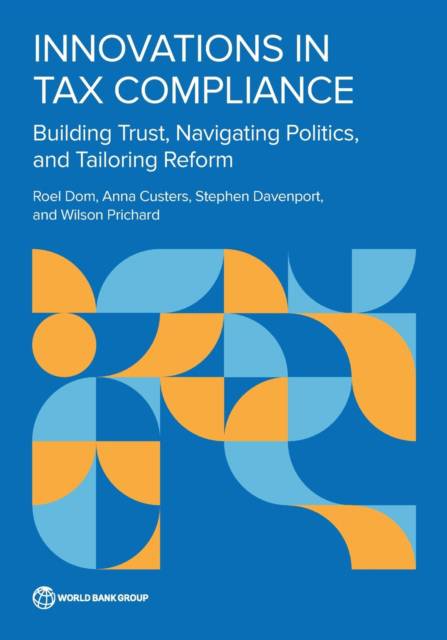
Bedankt voor het vertrouwen het afgelopen jaar! Om jou te bedanken bieden we GRATIS verzending (in België) aan op alles gedurende de hele maand januari.
- Afhalen na 1 uur in een winkel met voorraad
- In januari gratis thuislevering in België
- Ruim aanbod met 7 miljoen producten
Bedankt voor het vertrouwen het afgelopen jaar! Om jou te bedanken bieden we GRATIS verzending (in België) aan op alles gedurende de hele maand januari.
- Afhalen na 1 uur in een winkel met voorraad
- In januari gratis thuislevering in België
- Ruim aanbod met 7 miljoen producten
Zoeken
Innovations in Tax Compliance
Building Trust, Navigating Politics, and Tailoring Reform
Roel Dom, Anna Custers, Stephen Davenport, Wilson Prichard
Paperback | Engels
€ 79,95
+ 159 punten
Omschrijving
Recent decades have seen important progress in strengthening country tax systems. Yet many areas of reform have remained stubbornly resistant to major improvements. Overall, revenue collection still falls short of that needed for effective governance and service delivery. Tax collection is too often riddled with high rates of evasion among large corporations and the rich and by disproportionate, though often hidden, burdens on lower-income groups. As countries around the world deal with the large debt burdens induced by COVID-19, an in-depth look at how to strengthen tax systems is especially timely. Innovations in Tax Compliance: Building Trust, Navigating Politics, and Tailoring Reform takes a fresh look at tax reform. The authors draw on recent research and experience for their new conceptual framework to guide more effective approaches to reform. Building on the achievements of recent decades, they argue for a greater emphasis on the overlapping goals of building trust, navigating political resistance, and tailoring reform to unique local contexts--an emphasis achieved by identifying the most binding constraints on reform. This focus not only can lead to greater compliance, a fairer system, and higher revenues, but also can contribute to building state capacity, sustained political support for further reforms, and a stronger fiscal contract between citizens and governments.
Specificaties
Betrokkenen
- Auteur(s):
- Uitgeverij:
Inhoud
- Aantal bladzijden:
- 236
- Taal:
- Engels
Eigenschappen
- Productcode (EAN):
- 9781464817557
- Verschijningsdatum:
- 14/03/2022
- Uitvoering:
- Paperback
- Formaat:
- Trade paperback (VS)
- Afmetingen:
- 178 mm x 254 mm
- Gewicht:
- 576 g

Alleen bij Standaard Boekhandel
+ 159 punten op je klantenkaart van Standaard Boekhandel
Beoordelingen
We publiceren alleen reviews die voldoen aan de voorwaarden voor reviews. Bekijk onze voorwaarden voor reviews.









